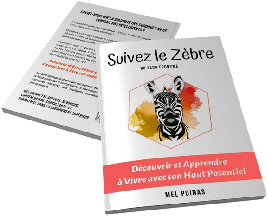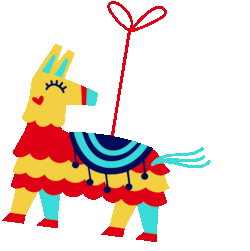“What is well conceived must be clearly stated”.
Nicolas Boileau
Understanding the psychology of HPI and their behaviors
Also known as zebra, atypical intelligence, or more commonly as gifted, precocious child, more recently high potential, HPI, high intellectual potential or intellectually precocious child. The English version, gifted, comes from the root gift .
At Suivez le Zèbre, we love the Zebra
I can understand the disappointment of some HPIs when they read the term zebra, which has become a bit overused and misused. In the team, we still love the image he projects. It has a soft, symbolic, exotic side, contradictory with its opposites of black and white engraved on the skin of this very special animal…
And yet it’s not necessarily an animal you love when you’re small or taking an example. We’ll love the tiger and lion for their strength and beauty. The horse for its presence, the dog or the cat because they’re pets that we’re close to and love.
The zebra has always reminded me of an animal halfway between a horse and a donkey, the funny version. I love his two-tone dress, as if he didn’t see the world in color! Besides, I’m a very dichotomous person myself, as kind and gentle as I can be harsh and brittle when someone hurts me.
In this article, I wanted to talk about the psychology of zebras. Recently, there has been a lot of fantasy surrounding HPI people. Then there’s this new HPE concept, which has spread like wildfire in just a few months, without ever having been demonstrated.
How does a High Potential person function? How do you live it?
Mel : Most of the time, I tell myself that yes, it’s a gift to be a zebra, to be very good at certain things. What I find funny is that in French we use the term surdoué to designate people with above-average cognitive abilities, whereas in certain fields, having these abilities makes us less gifted than people who are average…
I’ m gifted in some areas, very gifted in others, and then a little (a lot) handicapped in certain interpretations of human behavior.
When I say I’m gifted in certain areas, I mean I have a facility. I do things as if they were innate. I’m making rapid progress. I don’t encounter many difficulties, and when I do, I spend some time on it and it soon gets sorted out. I also learn better and faster when I learn alone! I’m a great autodidact and I like that. Now I tell myself, if I want to learn, then I’ll try!
I started playing guitar 6 weeks ago. A real revelation, so I’m on my toes and learning on my own. I don’t necessarily want to work with a teacher because when I was little, I tried to learn to play the drums. Total failure.

By the end, I was crying because I didn’t want to go anymore. My drum teacher didn’t have the right pedagogy for my atypical profile. As a result, I stayed away from music for almost 25 years because I was afraid of failing again. Not having the potential for music. In short, I was afraid of failure..
People with HPI have a real aptitude for learning, and this is what often makes parents and teachers take notice of children with HPI. They learn faster with less effort.
On the other hand, he’s a personality who loses his nerve very quickly when he misses or doesn’t understand. His behavior changes completely. When an HPI can’t do it, he or she quickly feels frustrated and like a loser. Hence the importance of practicing personal development and continuing research into human psychology. For gifted or HPI people, learning to master failure and turn it into an opportunity is essential to avoid depreciative or even depressive states. Helping them put things into perspective is also essential: if you’re bad at something, does that make you a bad person?
HPI and impostor syndrome
When faced with failure, high-potential people are prone to impostor syndrome. It’s as if they don’t accept their abilities. Once again, it has to do with these facilities… It’s as if you have to have a hard time producing work before you can be proud of the result.
Mel : Sometimes it is! Everyone thinks they’ve got it made, but it’s not always easy! Sometimes succeeding also requires a lot of hard work. I jog, I really struggle, I don’t have good basic cardio and I’m proud when I manage to finish the goal I’ve set myself. Then there are the easy, intuitive, instinctive things, which I do so well! Before (and it still happens to me sometimes) I couldn’t be proud of it because it seemed normal, or obvious… I realize that it’s quite an opportunity and quite practical too.
I always ask myself: is it a talent? Where do I draw the line between giftedness and talent? I don’t know and I’ll never know! And that’s okay 🙂 I’m working a lot on that: assuming I’m a zebra, assuming I’m good at things in a relaxed way!
Assuming to be a zebra is simply allowing yourself to be yourself without being ashamed of it.
Why are we ashamed of being HPI or zebra?
Many zebras are ashamed or afraid to admit they are gifted. We’re afraid of how others will react. Of being misunderstood, clumsy, misunderstood and judged. It takes a lot of courage to come out as a gifted person.
In the end, being yourself takes a lot of courage!
Mel : More and more, I’m having trouble with the society we live in. The society of performance, beauty and judgment… Then, thanks to the resilience and enthusiasm I have, which are quite characteristic of zebras, and which are also found in the psychology of High Potential profiles, I put things into perspective. There’s bad stuff, but there’s also cool stuff. And it really has become a spearhead: RELATIVIZE!
When you’re HPI, negative things affect you enormously. To the point of making us feel unwell, bordering on depression. We tend to carry the weight of the world on our shoulders. We feel responsible. It’s because we take things very (too) personally. So if we’re going to take things too personally, we might as well focus on the cool stuff!
Mel : In any case, we won’t change. We might as well focus our minds on things that make sense and on people who make us happy! Really cool people won’t judge us for being more talented than the average person. Those who judge are those who are jealous or stupid or both! Here again, use your psychology to let only beautiful people approach you!
The right mix of questioning and affirmation.
One of the qualities, and also a flaw, that gifted people often have is that they ask themselves lots of questions. It’s really exhausting for them!
Mel : Sometimes, I haven’t even started writing an article yet and I’m thinking that maybe it’s not relevant, maybe you won’t be interested, maybe the title and content aren’t coherent… Or maybe I’m reading other articles that say something similar to what I’m telling you, and I’m wondering if it’s really relevant after all?
I work a lot on that, to feel legitimate! Legitimate as a human being, legitimate as a woman, legitimate as a teacher, legitimate as a friend, legitimate as a zebra.
This work is of course personal, but others are also our mirror, and their kindness, advice and optimism are extremely important and influence us enormously in our daily lives. They are also much more sensitive to toxic and manipulative people than to enthusiastic and benevolent ones, as they often want to help or fix them.
Zebre, intense psychology
It’s essential to have the self-confidence to fend off manipulative people, and to surround yourself with the right people.
Whena zebra has confidence, it can move mountains. But when he gets bored, when he doubts, he becomes weak and apathetic. And his hypersensitivity and hyperemotionality exacerbate his feelings and emotions. As a result, they often come across as bipolar or borderline.
Mel: I love that line abouta zebra being sensitive to the flapping of a butterfly’s wing, because it’s true. At least it is for me. I feel everything so strongly! And sometimes it’s great… sometimes a little less so.
At least I feel alive. And my eternal quest for meaning in everything I do means that I have a very rich life.
Mel
Multipotential for a life in PROJECT mode!
I love Rapunzel, even though I’m not blonde at all, but we clearly share the same passions! Except that Léon is a bulldog, not a chameleon..
Do all zebras have the same psychological profile?
I don’t know. What I do know is that I get bored quickly (like many zebras). I’m a slasher. I have several jobs, including salaried work, fixed-term contracts and recently a micro-enterprise. I don’t distinguish between my professional life and my personal life.
I also have a lot of personal passionsI spend a lot of time on: baking, cooking, music, art, painting, drawing, sport, Leon, the web, psychology, marketing, culture, history, nature, hiking, travel, wine, books, TV series, DIY, decorating! In fact, sometimes I think I love so many things that it’s impossible to choose and fit everything into my schedule!
This allows me toavoid routine and repetition… I always need to learn or at least evolve, to see that I’m making progress. Again, zebra psychology or character trait?
My shrink recently told me that I’m a little bulldozer, that I need to move, stir, build, move forward… The bulldozer that digs, then compresses, then crushes to build or rebuild. At first sight it may seem a little pejorative, but in the end it’s an image that suits me. I’m not afraid. Like a bulldozer, I take on the mountains of obstacles in my life, and with my little bucket, I get to the bottom of them. I hate inertia, it makes me anxious…
I love the excitement of the projects, the perspective it brings. Start from scratch, learn, discover, build, finish, then start again! It’s what I do for a living… Project manager.
Herd of zebras?
It’s funny this morning my big sister tagged me on a Huffington post article with the headline, Learning I’m gifted at 34 turned my life upside down. .
As always, it was both fascinating and scary! Fascinating because this article, its content, I think you find almost the same content in my articles Follow the zebra part: daily!
I think we’re all a bit overwhelmed when we discover we’re high-potential (see article Discovering that you’re gifted and understanding).
All zebras, all alike, all the same?
It’s scary because sometimes I get the impression that we’re all the same, that we all have the same psychology. That we all feel the same way. And in a society where everyone is looking for their place and trying to assert their individuality, it’s a bit strange to see how strangers can be so similar!
It’s something I’ve been curious about since the beginning of my research,“this similarity” in our psychology! I know that high potential is genetic, but still. We’re not clones…
And finally, when I dig deeper, particularly via Facebook groups, or other blogs, I see that we all have the same way of working, the same psychology, but our characters, our passions, our degree of tolerance, our culture, our potential, our relationship to others, to ourselves, to solitude, can be very different, even opposed!
I’m also now convinced that discovering early that you’re a high-potential profile helps you to live with it better. When you discover it as an adult, it’s often the result of wandering in your studies, in your job, in your love life…
A misfit that stands out and often creates a mismatch. No matter what our psychology, where, when, what or who, the most important thing is to blossom!
You can also find more information, resources and tools on Giftedness in Mel POINAS‘ book. With a lot of humor, Mel tells the story of the discovery of her giftedness and the routines she put in place to finally find her place!

Le livre
Écrit par une HPI !
Un témoignage et des solutions concrètes pour découvrir, comprendre et apprendre à vivre en étant HPI.

To go further, you can read
- Right and left brain
- Zebra, laminar or complex profile?
- The best books about High Learning Potential
- Giftedness : 20 characteristics of complex and laminar profiles
- How to take the WAIS 4 test?
- How to tell others we are gifted?











